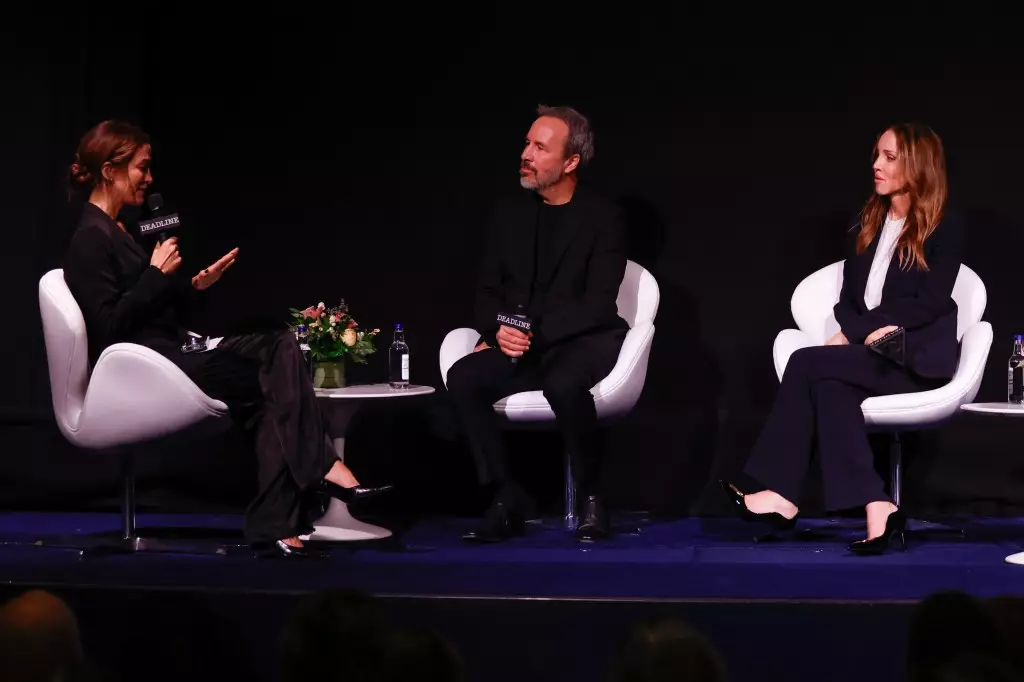In a recent panel at Contenders London, director Denis Villeneuve and producers Mary Parent and Tanya Lapointe delved into the intricacies of their cinematic adaptation of Frank Herbert’s Dune: Part Two. Their discussion illuminated not only the ambitious narrative they sought to deliver but also the profound themes that resonate through the film. As audiences continue to engage with this epic story, it becomes imperative to dissect the layers of meaning woven throughout the cinematic experience.
At the heart of Dune’s narrative is a cautionary exploration of charisma, seduction, and the ominous confluence of religion and politics. Villeneuve emphasized the importance of remaining faithful to Herbert’s vision, which warns of the dangers inherent in following charismatic leaders. This warning feels especially pertinent in the contemporary geopolitical landscape, where followers are often swept up in the rhetoric of charm without scrutinizing the underlying motives. Villeneuve’s commitment to this theme reinforces the timeless nature of Herbert’s storytelling, as the viewer is continually reminded that the specters of power and influence are as relevant today as they were during the 1960s when the novel was first published.
Amidst the grand themes of power and ethics, Dune: Part Two intricately weaves a poignant love story between its central characters, Paul Atreides and Chani. Both Villeneuve and Parent highlighted that their relationship is more than mere romantic interlude; it serves as a vital narrative thread helping to ground the story in human emotion. In a universe marked by conflict and political machinations, the personal trials of young love navigating these turbulent waters offer a relatable contrast. The filmmakers have crafted a narrative where love becomes a source of strength and vulnerability, allowing the audience to connect deeply with the characters’ personal journeys. Villeneuve’s focus on this emotional core showcases his dexterity as a filmmaker, complementing grand themes with intimate storytelling.
Another significant aspect of this cinematic exploration is the portrayal of female characters, particularly the Bene Gesserit order, which Villeneuve and Lapointe passionately discussed. The filmmakers emphasized the importance of crafting characters that exhibit their agency, navigating a world of male-dominated power structures with strength and autonomy. Villeneuve’s insistence on showcasing complex female roles subverts traditional tropes often seen in epic narratives, allowing these characters to drive the story forward rather than being passive participants. This emphasis on female agency in Dune: Part Two not only enriches the narrative but also invites a larger conversation about representation in genre filmmaking.
As the conversation shifted toward potential future endeavors in the Dune franchise, Villeneuve playfully suggested that any further installments would carry the themes of conflict and war to new heights. This foreshadows the enormity and stakes of Paul’s journey, as the narrative propels him into the complexities of leadership and moral choice. The notion that love and war are interconnected components of the story reinforces the overarching themes of sacrifice and responsibility – elements that will resonate deeply with audiences.
Villeneuve’s vision for a potential third film demonstrates his commitment to exploring these themes further, suggesting that the saga of Dune is far from over. His confidence in tackling such ambitious material indicates an unwavering dedication to Herbert’s legacy and the intricate storytelling it inspires.
Dune: Part Two is not just a cinematic triumph; it is a profound commentary on the human condition, political complexities, and the enduring nature of power dynamics. Through Villeneuve’s lens, audiences are invited to examine their own roles within these narratives, drawing connections between cinematic experiences and real-world ramifications. As we journey with Paul Atreides and Chani through a visually stunning landscape marked by both beauty and brutality, we are continually reminded of the lessons inherent in their struggles—themes as relevant today as they were upon Herbert’s original publication. In a world rife with charismatic leaders and ethical conundrums, Dune remains an essential narrative for our times, making its exploration not just a film viewing, but an urgent reflection on our collective human experience.


Leave a Reply